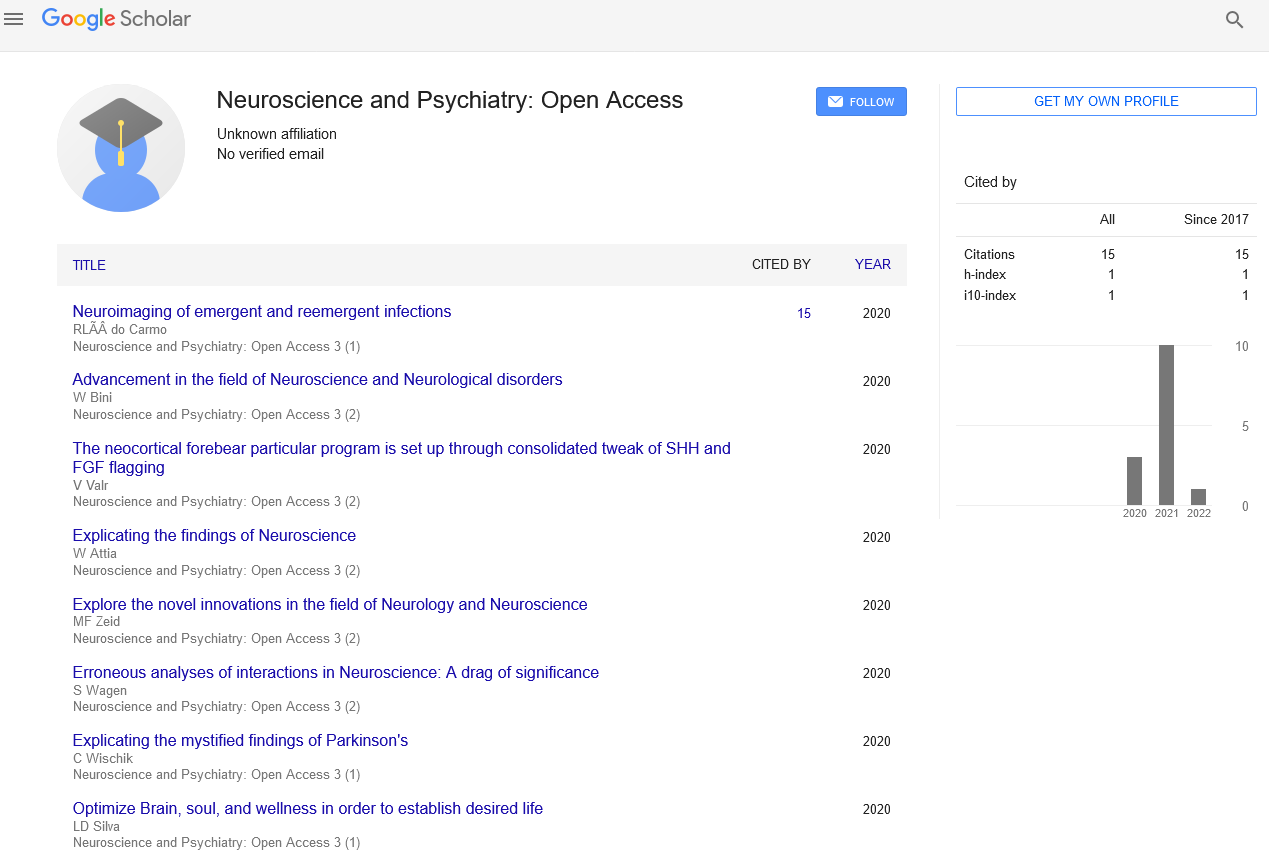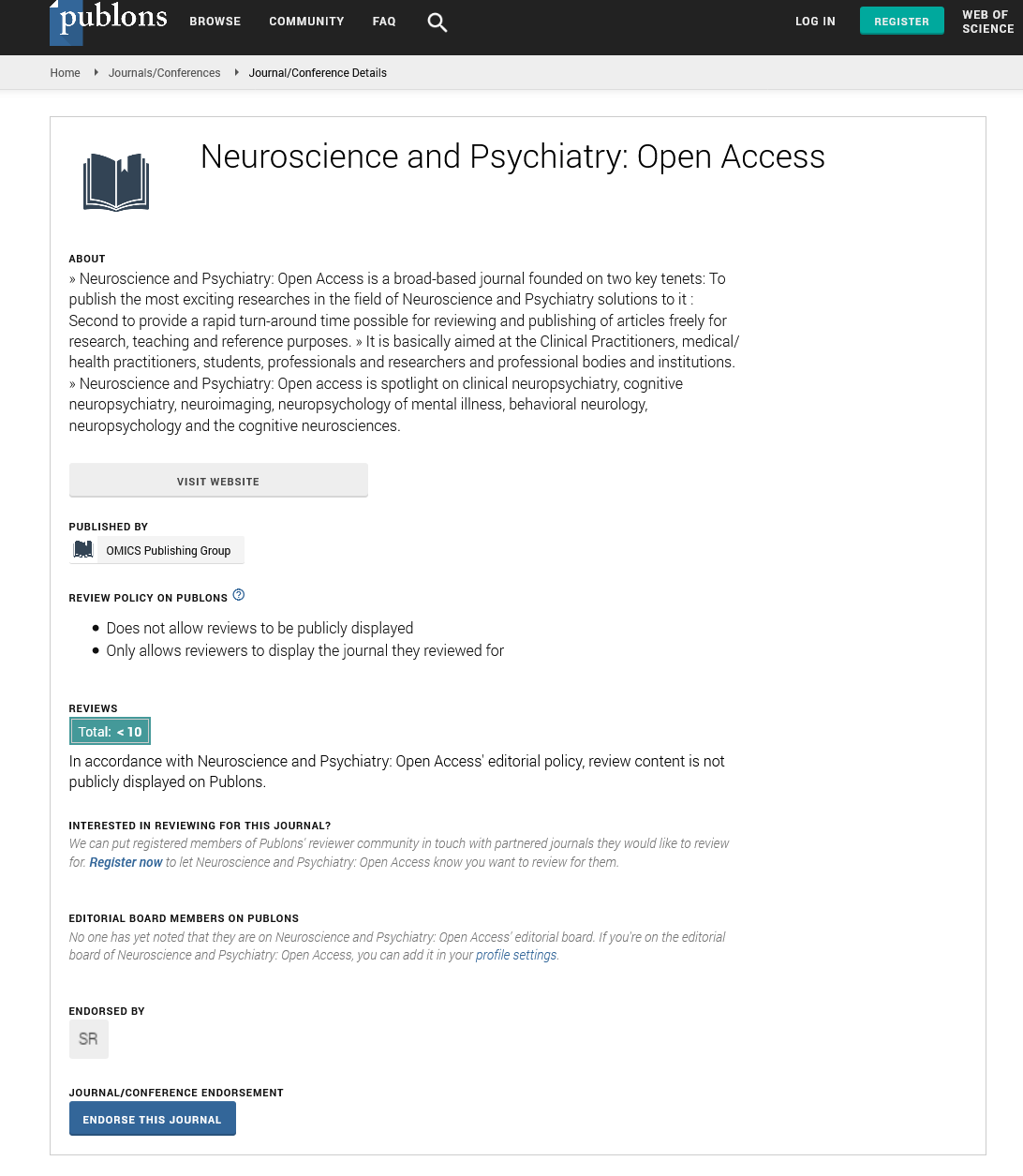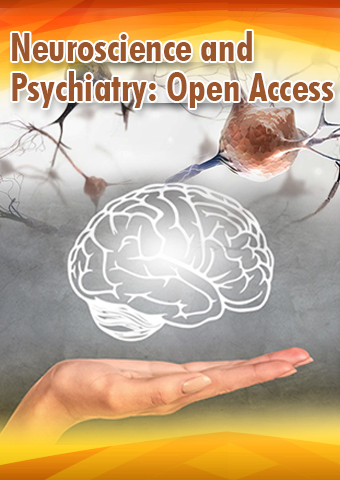Editorial - Neuroscience and Psychiatry: Open Access (2023) Volume 6, Issue 4
Mood Disorders: Causes, Symptoms, and Treatment Strategies
Helen Leahy*
University of Canada, Department of Neuroscience, Construction Engineering
University of Canada, Department of Neuroscience, Construction Engineering
E-mail: helen@gmail.com
Received: 01-08-2023, Manuscript No. npoa-23-109736; Editor assigned: 04-08-2023, Pre QC No. npoa-23- 109736; Reviewed: 18-08-2023, QC No. npoa-23-109736; Revised: 25-08-2023, Manuscript No. npoa-23- 109736 (R); Published: 31-08-2023, DOI: 10.37532/npoa.2023.6(4).92-94
Abstract
Mood disorders are a group of complex mental health conditions that significantly impact an individual's emotional state, leading to persistent changes in mood and affect. This article provides an overview of the causes, symptoms, and treatment strategies related to mood disorders. The types of mood disorders discussed include Major Depressive Disorder (MDD), Bipolar Disorder, Persistent Depressive Disorder (PDD), and Seasonal Affective Disorder (SAD). The causes of mood disorders are multifactorial, involving genetic, biological, environmental, and psychological factors. Neurotransmitter imbalances, brain structure and function abnormalities, life events, and chemical imbalances contribute to the development of mood disorders. Common symptoms include persistent sadness, loss of interest, changes in appetite and sleep patterns, and thoughts of death or suicide. Treatment approaches encompass psychotherapy, medication, lifestyle changes, support groups, and Electroconvulsive Therapy (ECT) in severe cases. Early detection and effective management are crucial to improving the quality of life for individuals affected by mood disorders. Seeking professional help from mental health experts and accessing appropriate support can offer hope and relief for those facing mood disorder challenges.
Keywords
Mood disorders • Affective disorders • Major depressive disorder • Bipolar disorder • Persistent Depressive disorder • Seasonal Affective disorder • Causes of mood disorders • Symptoms of mood disorders • Neurotransmitter imbalances • Brain structure and function • Genetic factors • Environmental factors • Psychological factors • Chemical imbalances • Treatment strategies
Introduction
Mood disorders are a wide and difficult category of mental health diseases that have a significant impact on an individual's emotional well-being and daily functioning [1]. These diseases, often known as affective disorders, cover a wide spectrum of conditions characterised by persistent and abnormal mood fluctuations that impact millions of individuals worldwide [2]. Individuals suffering with mood disorders may experience times of great melancholy, apathy, or hopelessness, as well as alternating experiences of tremendous highs and lows [3]. Understanding the causes, symptoms, and treatment options for mood disorders is critical for ensuring early detection, effective management, and improved quality of life for individuals affected [4]. Major Depressive Disorder (MDD), Bipolar Disorder, Persistent Depressive Disorder (PDD), and Seasonal Affective Disorder (SAD) are the most common forms of mood disorders [5]. Each variety provides its own set of issues, necessitating tailored treatment techniques to address the distinct symptoms and underlying reasons. Unravelling the components that contribute to mood disorders entails investigating a variety of genetic, biochemical, environmental, and psychological factors [6]. Among the primary elements that influence the development and progression of mood disorders are neurotransmitter imbalances, changes in brain structure and function, genetic predisposition, life experiences, and chemical imbalances. Recognising the many symptoms of mood disorders is critical for prompt intervention and assistance [7]. Mood disorders can cause feelings of deep melancholy, hopelessness, and lack of interest in previously loved activities, as well as periods of heightened mood, increased energy levels, and impulsive behaviour during manic episodes [8]. While the burden of mood disorders can be overwhelming, effective treatment options provide hope [9]. Psychotherapy, such as Cognitive Behavioural Therapy (CBT) and other evidencebased therapeutic modalities, can assist individuals in gaining insight into their thoughts and feelings, resulting in healthier coping skills [10]. Antidepressants and mood stabilisers are often prescribed medications to control brain chemistry and manage the symptoms of mood disorders.
Types of mood disorders
Major depressive disorder (MDD): Depression, also known as Major Depressive Disorder, is one of the most common mood disorders. It is characterised by chronic melancholy, lack of interest in previously loved activities, feelings of worthlessness, and a dramatic decline in energy levels. Individuals suffering from MDD may notice changes in appetite and sleep patterns, as well as suicidal thoughts in extreme cases.
Bipolar disorder: Bipolar Disorder is characterised by significant mood swings that alternate between periods of depression and mania. Individuals experiencing manic episodes may have increased energy, creativity, impulsivity, and euphoria. In contrast, during depressed periods, people may feel gloomy, lethargic, and lose interest in activities.
Persistent depressive disorder (PDD): Persistent Depressive Disorder (PDD), formerly known as dysthymia, is a chronic form of depression. Unlike MDD, the symptoms of PDD are less severe but last for a longer period of time, generally two years or more. People with PDD can function in their daily activities, although they frequently describe themselves as being depressed.
Seasonal affective disorder (SAD): is a mood illness characterised by recurrent depression episodes that frequently occur throughout specific seasons, most commonly during the autumn and winter. Reduced sunshine exposure and variations in circadian rhythms are thought to contribute to the development of SAD.
Symptoms of mood disorders
The symptoms of mood disorders can vary depending on the specific condition and its severity. However, some common symptoms include:
Persistent sadness or irritability
1. Loss of interest or pleasure in activities
2. Changes in appetite and weight
3. Sleep disturbances (insomnia or hypersomnia)
4. Fatigue and low energy levels
5. Feelings of worthlessness or guilt
6. Difficulty concentrating or making decisions
7. Thoughts of death or suicide
Treatment approaches for mood disorders
Fortunately, mood disorders are treatable, and various approaches can be effective in managing symptoms and improving the overall quality of life. Common treatment strategies include:
Psychotherapy: Psychotherapy, also known as talk therapy, involves working with a trained therapist to explore thoughts, emotions, and behaviors related to the mood disorder. Cognitive Behavioral Therapy (CBT) is particularly effective for depression and anxiety disorders.
Medication: Antidepressants, mood stabilizers, and antipsychotic medications may be prescribed to regulate brain chemistry and alleviate mood disorder symptoms.
Lifestyle changes: Regular exercise, a balanced diet, sufficient sleep, and stress reduction techniques can have a positive impact on mood and overall mental well-being.
Support groups: Joining support groups can provide a sense of community and understanding, allowing individuals to share experiences and coping strategies.
Conclusion
Mood disorders are complex medical problems that impact millions of people worldwide. Understanding the many forms of mood disorders, as well as their origins and symptoms, is critical for early detection and efficient treatment. Individuals suffering from mood disorders can live happy lives and experience increased emotional well-being with the right treatment, support, and lifestyle changes. If you or someone you know is experiencing symptoms of a mood disorder, seeking professional support from mental health experts is critical for a thorough examination and personalised treatment plan. Remember that persons suffering from mood disorders have hope and support. Mood disorders continue to be a significant problem in the field of mental health, affecting millions of people worldwide. This article has presented an overview of the causes, symptoms, and treatment techniques for mood disorders, shedding light on the complexities of these problems and emphasising the significance of early detection and good care. Fortunately, numerous therapy techniques are available to assist in the efficient management of mood disorders. Psychotherapy, particularly Cognitive Behavioural Therapy (CBT), has been shown to be effective in addressing cognitive patterns and emotions, resulting in healthier coping methods and improved mental resilience. Medications, lifestyle changes, and support groups all play important roles in aiding individuals on their path to emotional well-being and rehabilitation. It is critical to emphasise the importance of decreasing stigma associated with mood disorders and mental health in general. Open dialogue, empathy, and understanding can assist to create a more friendly and inclusive environment for persons suffering from mood disorders, enabling them to seek care without fear of being judged. Finally, by raising awareness and information about mood disorders, we can create a caring and knowledgeable culture that actively supports and empowers those who face these issues. Early intervention, access to appropriate mental health care, and a holistic approach to therapy can help persons affected by mood disorders have a brighter future. We can work together to create a society where mental health is prioritised and people with mood disorders may live fulfilling lives full of hope and resilience.
References
- Rodrigues FB.Endovascualar treatment versus medical care alone for ischemic stroke: a systemic review and meta-analysis. BMJ. 57, 749-757 (2016).
- Dwyer, Claire. ‘Highway to Heaven’: the creation of a multicultural, religious landscape in suburban Richmond, British Columbia. Soc Cult Geogr. 17, 667-693 (2016).
- Jellish WS. General Anesthesia versus conscious sedation for the endovascular treatment of acute ischemic stroke.J Stroke Cerebrovasc Dis. 25, 338-341 (2015).
- AlSawaftah N, Pitt WG, Husseini GA et al. Dual-Targeting and Stimuli-Triggered Liposomal Drug Delivery in Cancer Treatment. ACS Pharmacol Transl Sci. 4, 1028-1049 (2021).
- Thorn, Caroline F, Doxorubicin Pathways: Pharmacodynamics and Adverse Effects. Pharmacogenet Genomics. 21, 440-446 (2011).
- Imrie, Rob. Industrial change and local economic fragmentation: The case of Stoke-on-Trent. Geoforum. 22, 433-453 (1991).
- Dora, Veronica Della. Infrasecular geographies: Making, unmaking and remaking sacred space. Prog Hum Geogr. 42, 44-71 (2018).
- Harrison, Paul. How shall I say it? Relating the nonrelational .Environ Plan A. 39, 590-608 (2007).
- Carrillo JE, Carrillo VA, Perez HR et al. Defining and targeting health care access barriers. J Health Care Poor Underserved. 22, 562-75 (2011).
- Qaseem A, Vijan S, Snow V et al. Glycaemic control and type 2 diabetes mellitus: the optimal haemoglobin A1C targets, a guidance statement from the American College of Physicians. Annals of Internal Medicine. 147, 417-422 (2007).
Indexed at, Google Scholar, Crossref
Indexed at, Google Scholar, Crossref
Indexed at, Google Scholar, Crossref
Indexed at, Google Scholar, Crossref
Indexed at, Google Scholar, Crossref
Indexed at, Google Scholar, Crossref
Indexed at, Google Scholar, Crossref
Indexed at, Google Scholar, Crossref
Indexed at, Google Scholar, Crossref


